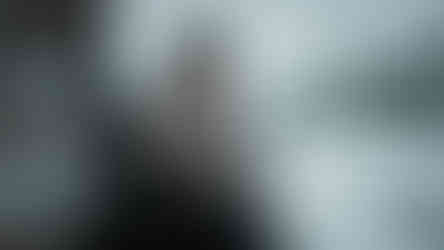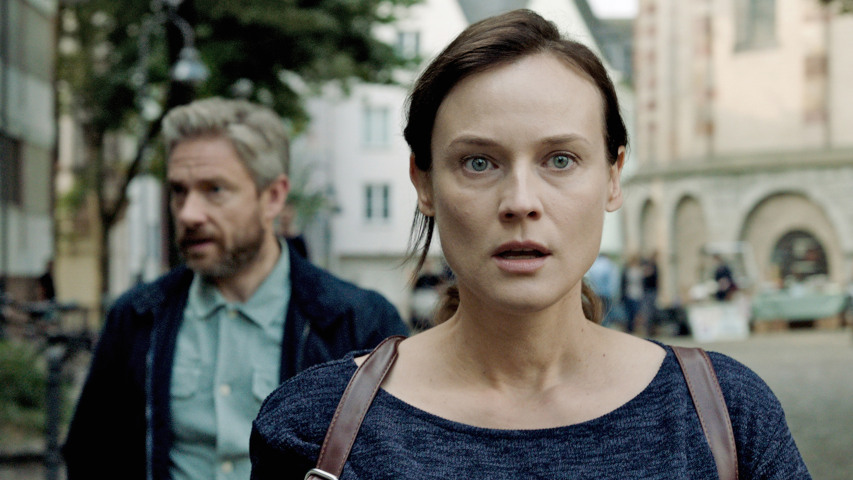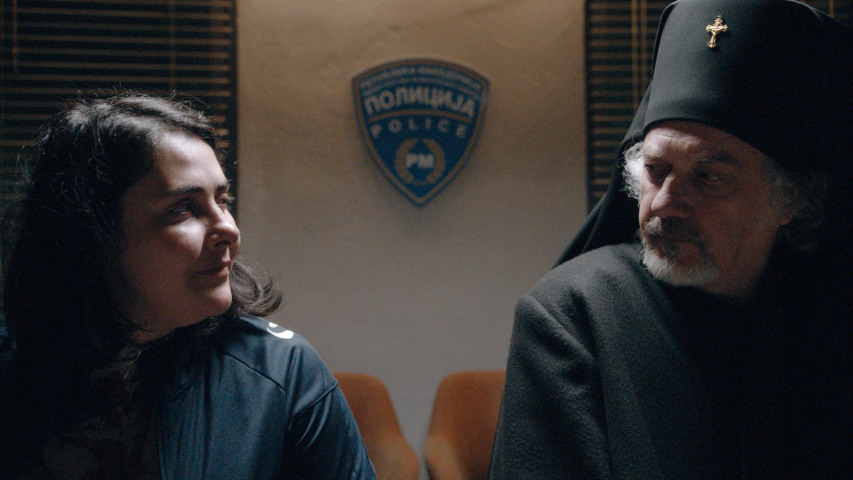Berlinale 2019 – Day 4: They all have a Cross to Bear, She, and He, and They too!
- Christian Hain
- Feb 10, 2019
- 6 min read
Updated: Mar 23, 2020
(Berlin.) Returning home from another unsuccessful job interview at a sweatshop in the Macedonian outback, overweight, 32 years old, a historian by degree and as we learn much later: self-proclaimed communist, Petrunya dives into the river to recover a crucifix the village priest has just thrown from a bridge. Not for fun, but as a part of an ancient tradition that includes the male youth competing in a wintry swimming contest for local fame and otherworldly favour. Petrunya can give no special reasons for her spontaneous act, but once the crucifix is in her hands, she won’t give it back soon. Teona Strugar Mitevska’s God Exists, Her Name is Petrunya follows the protagonist first escaping to her family home and later getting – not exactly arrested, but invited to the Police station. Outside, an angry mob forms and a TV reporter arrives from Skopje to prove her Western/Global ways in fervently forcing her interpretation of facts upon the viewer, manipulating and cheating like a good journo. This media satire is quite funny (should it indeed be meant as such, and not serious by a director whose film seems very Western/globalized as well).
That ritual of crucifix-diving, it needs to said, appears to have lost its spiritual relevance for most participants over the years (possibly centuries), and become more of an event, a spectacle. However, just to spite them all, Petrunya remains stubborn, and refuses to give up her price (her claimed Communism won’t keep her from cherishing some prrecious private property). Only at the very, after having once secure the moral victory, she’ll finally give it up.
Traditions are not well-seen where efficiency rules, global unification under only one ideology is the word of the day (and there are reasons for this).
If you insist, read the film in a different way, think of a religious parable, with the instable Petrunya instinctively reaching for hope in an ever more desperate situation; that mob gets quite “passion”-ate too. But this is probably not the general intention here.
But now excuse me please, I need to board a flight to Skopje. - I intend to visit a female-only athletics competition, position myself near the finishing line and win that race. For so much we’ve learned today: ‘Rules are not laws, keeping the prize is not illegal, there’s nothing the police can do.’ Must try it at the Olympics, too, bigger prize money there.
WArts Verdict: Maybe Mitevska and her lead actress Zorica Nusheva will storm the stage on Awards Night and just take that Bear home?
Sitting in a cinema with the lights still on, I was discussing the festivals’ quality so far with a colleague (ok, rather from blogger to true journo), and we both agreed, it would be time for a true starter, a worthy opener.
Then, Yuval Adler’s The Operative started, and there it was.
Brilliant. Dark. Disturbing, Captivating. 120 minutes that felt like 20 at most. The Operative is one of the, if not the, most authentic (well: feeling authentic for a civilian) spy movie ever.
A woman of mixed origins – father British, deceased mother German, raised as a Protestant but “half-Jewish – on the fathers’s side” (which is an important detail in a certain contexts) – is hired by the Mossad. First only assisting a death squad in murdering a weapon sanctions breaching German businessman, she later gets sent to Iran. But while she proves greatly successful in her mission as a agent provocateur, enticing an Iranian entrepreneur to accept a fake deal importing sanctioned electronic parts (he’s presented as a most Western, apolitical, and non-fanatic character who only wants to earn that extra-cash), she unfortunately develops a conscience, falls in love - not a prearranged honeytrap thing, mind! -, and besides does not exactly enjoy an extra mission that makes her instrumental in bombing two scientists and their families (also her superiors here associated her with a bunch of rather rude Kurdish smugglers).
At some point you should however realize, how one-sided the story is, all Iranians basically being good guys who could never do anybody harm. This is a valid objection indeed, and it might even lead to reproaches using the bad a-word, anti-Semitism – after all, the depiction of the Israeli secret service, its ruthlessness and supposed “omnipotence” appear like a caricature of World conspiracy/Illuminati bullsh— But let’s trust the (Israeli, Jewish, obviously) director here. The story’s also based on the novel of an Israeli ex-spy. Finally remember, the CIA regularly did (still does) even more evil things and in the end, there is some justification behind their actions.
Although the end credits protect us from sad certainty (and “knowing too much”), James Bond himself could not manoeuvre himself out of the situation. Diane Kruger does a great job as the Operative - the film is German co-financed, from all countries!
WArts Verdict: Confidential. This website will destroy itself in 5...4...3...2... No, stop, don’t worry! And please don’t cry: Of course, James would find a way out, yes, and Jason Bourne, too!
We don’t live in the age of neutrality, film, and all media in general, don’t see any problem in promoting an agenda - as long at it is “the right one”! Watching a film, you should always remember the words “(S)He who controls the past, controls the future; and (s)he who controls the present, controls the past.” There’s a reason for all those anachronisms. Those words, of course, are taken from George Orwell’s 1984, and it’s always funny – “outrageous” is actually the better term -, who is quoting that work in all the wrong contexts. He was aiming at you, yes indeed: you.
Most of us have also forgotten all about Animal Farm since being foced to read it in school, which is perfectly good for Agnieszka Holland who uses some lore surrounding the novel’s creation for a background to her movie Mr Jones. Mr Jones, given name Gareth, is a historic figure, a journalist and for a short time in the 1930s advisor of British prime minister George Lloyd. He once did an interview with Adolf Hitler and become one of the very few to realize the looming danger and vocal his concerns long before the catastrophe. After leaving politics, Jones took a trip to Soviet Russia, where he visited Ukraine without authorization and told the world - that was still impressed with Stalin - about the genocide/famine there.
His reports, and personal acquaintance with Orwell, are said to have inspired the writer to Animal Farm. In Holland’s film, “Orwell” reads several passages, making us believe it would agitate against both murderous variants of Socialist materialism, the National German variant and the International Soviet one, where in fact it only addresses the latter one and its infighting.
Those inaccuracies are annoying, yet not as annoying as the cameraman who should maybe be sent to a Gulag for his work here. All those shaky hand cameras – did they only employ epileptics/Parkinson cases/alcoholics on withdrawal? Not to speak of filmic “experiments” like accelerating only the background of an image (I’ve seen this in some cheap horror movie before, abrupt stop motion movements).
Relating a historic episode, the task is to explain the general by the individual. Mr Jones fails in this respect. Repetitive shots of the journalist eating tree bark because there’s nothing else left, might be telling of a trauma involving Charlie Chaplin’s Gold Rush on behalf of the director, but it is not sufficient to make the audience “feel” the suffering. Only a “family dinner with kids” (choose your favourite inappropriate joke, “Jeffrey Dahmer likes this” or “the Donnerski Party”) is the single truly shocking, and thereby convincing, scene.
Needless to say, that the female character, another Western journalist, belongs to those falsifications of history alluded to above. To talk of the past, at least in a mass media context, has often contemporary goals and motives. Mr Jones is a British-Ukrainian-Polish coproduction. British-Russian relations have already been better than in times of Litvinenko, Skripal, &ct. There has been a certain conflict in the Ukraine not long ago. In the fiilm we hear phrase like “you cannot imagine how difficult it is to be a correspondent in Moscow today.” Indeed, the film’s main events are true. But they’re probably not told for the sake of truth alone. Propaganda is a nasty thing, that can pervert everything good. Be on the watch for all attempts to manipulate you (does that sound paranoid? Or this?).
WArts Verdict: Having won one of the many obscure awards in the broader context of Berlinale in 2017 already, Agnieszka Holland is still hungry. We’re awfully sorry, but the "Bear flambé à la Auric Goldfinger with a layer of leaf gold and covered in sauce Champagne" is out. May we serve you a glass of vodka instead?






Comments